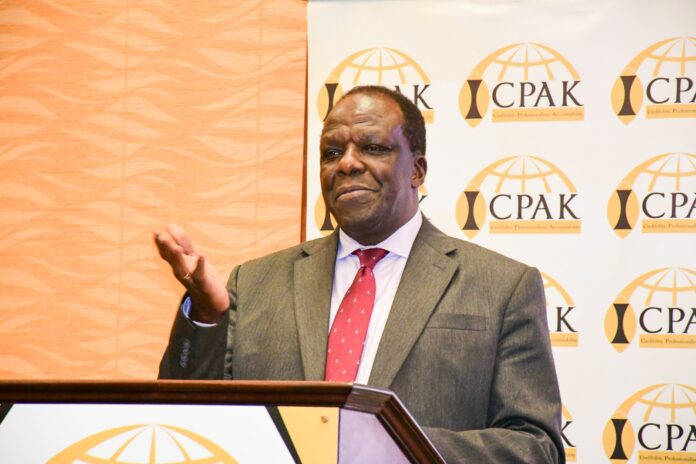The government has strongly rebutted a report released by the Kenya Human Rights Commission (KHRC) that criticizes the Hustler Fund, terming it politically motivated, misleading, and based on flawed data.
In a press briefing Monday afternoon, Cabinet Secretary for Co-operatives and Micro, Small and Medium Enterprises Development, Wycliffe Oparanya, accused the KHRC of drawing premature conclusions on the Fund’s performance based on just seven months of operations during the 2022/2023 financial year.
“Our attention has been drawn to a report widely circulated by the KHRC claiming the failure of the Hustler Fund, drawing conclusions that are politically veiled. The title of the report explicitly betrays the whole purpose of the study,” Oparanya stated, referring to the KHRC’s report titled “Failing the Hustlers.”
The KHRC report, released earlier Monday, described the Hustler Fund as a structurally unsound and economically unsustainable initiative. It recommended that the government scrap the fund, saying it had failed to empower low-income Kenyans as promised.
However, CS Oparanya dismissed the assessment, noting that the KHRC failed to consult either the ministry or the fund’s management during its investigations.
“If the NGO was genuine in its pursuit, they would at the least have adhered to the professional ethical standards that govern such studies. Neither the ministry nor the Fund’s management was approached for clarification or input,” Oparanya said.
He also dismissed claims that the government had injected Ksh 50 billion into the Hustler Fund. Instead, he clarified that Ksh 14 billion has been invested, supporting a revolving portfolio currently valued at Ksh 72 billion.
The Ministry reports that since its inception, the Hustler Fund has disbursed Ksh 72 billion, of which Ksh 60 billion has already been repaid. The digital loan platform, accessed via *254#, allows users on both smartphones and feature phones to borrow up to Ksh 50,000 in personal loans and up to Ksh 150,000 in bridge loans, with repayment periods ranging from 14 to 60 days.
Responding to claims that loan amounts are too small and that default rates are high, Oparanya clarified: “The report lazily claims that we lend between Ksh 500 to Ksh 1,000, when in actual sense, beneficiaries can access up to Ksh 150,000. As of now, the default rate stands at 20 percent, not the exaggerated 68.3 percent stated.”
He also highlighted the Fund’s contribution to financial inclusion, credit repair, and agricultural financing. According to the CS, the initiative has mobilized over Ksh 5 billion in savings and introduced a behavioral credit scoring system aimed at helping previously blacklisted individuals re-enter the financial system.
Dismissing the KHRC report as “elitist” and “skewed,” Oparanya maintained that independent studies, including one by the Central Bank of Kenya, affirm the Fund’s growing impact across key sectors.
“This is not just about loans. It’s about financial empowerment, digital inclusion, and restoring dignity to millions of Kenyans left out of the formal financial system,” he said.
Written By Rodney Mbua


















